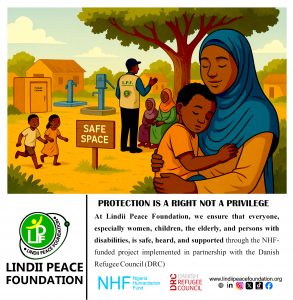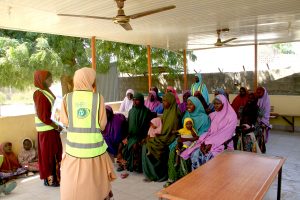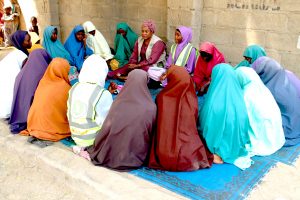LINDII PEACE FOUNDATION’S COMMITMENT TO SAFEGUARDING LIVES
Protection is more than just a principle in humanitarian settings — it is a life-saving imperative. Conflict, displacement, and the breakdown of social systems often expose already vulnerable populations to grave risks, including gender-based violence (GBV), exploitation, neglect, and abuse.
Through the NHF-funded project, Lindii Peace Foundation (LPF), in collaboration with the Danish Refugee Council (DRC), has stepped up to address these protection concerns by embedding protection across its humanitarian response efforts in Borno State, Nigeria, particularly in Bama LGA.

Understanding Protection Concerns in Conflict Zones
In conflict-affected communities like those in northeast Nigeria, protection challenges are widespread and complex. Women and girls face a heightened risk of GBV, children are often exposed to unsafe environments, and displaced populations may lack access to legal and psychosocial support.
Key protection concerns include:
- Gender-Based Violence (GBV), including early/forced marriage and intimate partner violence
- Child protection issues such as forced labor, recruitment by armed groups, and lack of education
- Exploitation and abuse, often linked to unequal power dynamics and poor access to information
- Limited awareness of or access to confidential complaint and referral systems
- Social stigma surrounding survivors of violence hinders reporting and recovery
LPF & DRC’s Collaborative Response: An Integrated Protection Approach
Under the NHF-funded initiative, LPF, in partnership with DRC, has taken a multi-layered, community-centered approach to ensure vulnerable individuals are protected and empowered.

Key Activities Include:
Door-to-Door Hygiene Promotion: Integrated with protection messaging to reach women and girls in safe, private spaces.
Protection Mainstreaming in WASH: Gender- and age-sensitive sanitation facilities to reduce risks of GBV.
Establishment of Complaint and Feedback Mechanisms (CFMs): Safe, accessible, and confidential systems for reporting protection incidents or service gaps.
Training and Capacity Building: Empowering Community Health Promoters, CRM Desk Attendants, and Mobilizers with knowledge on GBV prevention, safeguarding, and referral pathways.
Psychosocial Support and Awareness: Delivered through community sessions and referrals to partners where needed.
Advocacy and Inclusion: Ensuring women, youth, and persons with disabilities participate in community decision-making related to humanitarian aid.

Community Engagement: The Heart of Our Protection Strategy
LPF and DRC recognize that protection cannot be externally imposed — it must be community-owned. Through focus group discussions, feedback forums, and participatory assessments, we actively listen to community voices, especially those often unheard: adolescent girls, female heads of households, the elderly, and people with disabilities.
This approach ensures that interventions are contextually relevant, inclusive, and culturally sensitive, fostering trust and resilience within communities.
Conclusion: A Commitment to Safety, Dignity, and Empowerment
Protection is an ongoing process that requires constant attention, investment, and accountability. The NHF-funded project, implemented by LPF in collaboration with DRC, reflects a firm commitment to upholding the rights and dignity of conflict-affected populations.
Together, we aim to create an environment where every person, regardless of gender, age, or status, feels safe, heard, and respected.
Let us continue to work hand-in-hand with communities to build a safer, more inclusive future.

